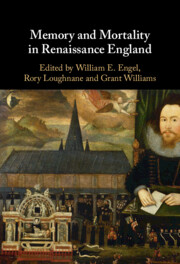Book contents
- Memory and Mortality in Renaissance England
- Memory and Mortality in Renaissance England
- Copyright page
- Dedication
- Contents
- Figures
- Notes on Contributors
- Acknowledgements
- Introduction
- Part I The Arts of Remembering Death
- Chapter 1 Death and the Art of Memory in Donne
- Chapter 2 Spiritual Accountancy in the Age of Shakespeare
- Chapter 3 Recollection and Pre-emptive Resurrection in Shakespeare’s Sonnets
- Chapter 4 Learn How to Die
- Part II Grounding the Remembrance of the Dead
- Part III The Ends of Commemoration
- Parting Epigraph
- Bibliography
- Index
Chapter 2 - Spiritual Accountancy in the Age of Shakespeare
from Part I - The Arts of Remembering Death
Published online by Cambridge University Press: 06 October 2022
- Memory and Mortality in Renaissance England
- Memory and Mortality in Renaissance England
- Copyright page
- Dedication
- Contents
- Figures
- Notes on Contributors
- Acknowledgements
- Introduction
- Part I The Arts of Remembering Death
- Chapter 1 Death and the Art of Memory in Donne
- Chapter 2 Spiritual Accountancy in the Age of Shakespeare
- Chapter 3 Recollection and Pre-emptive Resurrection in Shakespeare’s Sonnets
- Chapter 4 Learn How to Die
- Part II Grounding the Remembrance of the Dead
- Part III The Ends of Commemoration
- Parting Epigraph
- Bibliography
- Index
Summary
Shakespeare inherited from the Middle Ages a long-standing association between debt and death. As a consequence of the Reformation’s elimination of purgatory, however, the relationship between debt and death had recently undergone a sea change. This chapter aims to show how a repeated pun of Shakespeare’s, one binding ‘debt’ to ‘death’, signals a shift in the relation between the living and the dead in early modern England: one brought about by the Reformation, and specifically its denial of purgatory. The reconfiguring of relations between the dead and their survivors turned largely on the idea of debt, especially that of a spiritual debt accrued over a lifetime as the commission of sins exceeded their remission. For the people of pre-Reformation England, purgatory was a debtor’s prison in which souls would suffer a temporal punishment for sins that had been forgiven, but for which they still owed a debt. Central to a post-Reformation understanding of the relation between debt and death was the growing practice of double-entry bookkeeping. Double-entry’s key idea of ‘balance’ bore heavy theological implications, evoking the scales of justice and the symmetry of a divine plan.
Keywords
- Type
- Chapter
- Information
- Memory and Mortality in Renaissance England , pp. 45 - 60Publisher: Cambridge University PressPrint publication year: 2022



